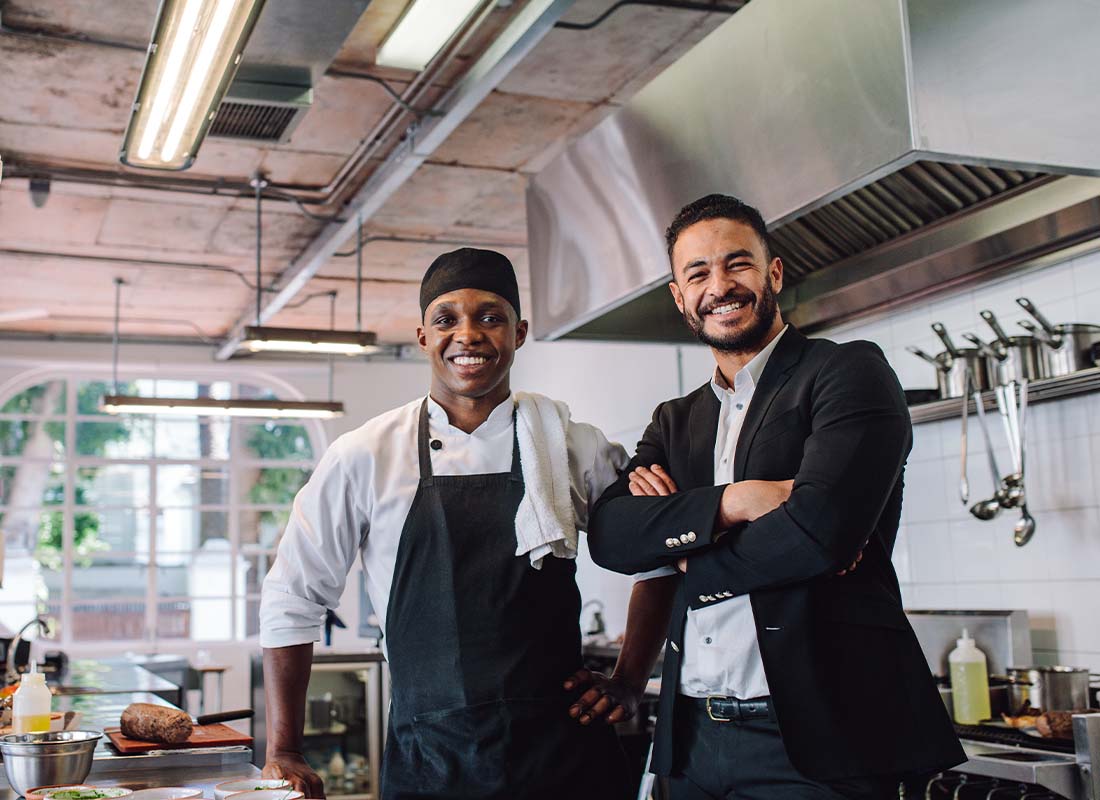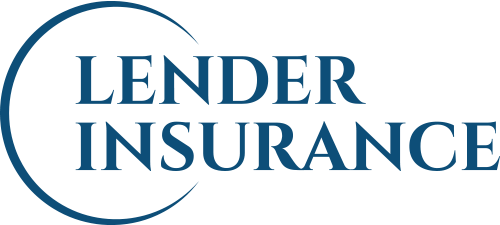
You worry about the cooking. We’ll handle the restaurant insurance.
Insurance that works as hard for your business as you do.
As a restaurant owner, you know the amount of work it takes to run your business on a day-to-day basis. You might also know the statistics about how tough it is to survive and thrive in the restaurant business. But did you know that getting a restaurant insurance policy may help give you a fighting chance by mitigating some of the risks involved in the food industry?
What every restaurant owner should know about insurance.
On top of traditional business insurance, it’s worth considering a restaurant insurance policy, as this may not only make life simpler but may even cover some risks you hadn’t considered. There are unique aspects of running a restaurant that make it different from other types of businesses, which means different types of coverage might be required.

Any establishment that sells, serves, or assists in the purchase or use of liquor is open to a liability claim as a consequence of someone getting inebriated to the extent that injuries or property damage result.
If you are in the business of selling or serving alcohol, it is critical that you protect yourself from potential financial losses by obtaining a liquor liability insurance policy. Having the right policy in place could help cover your legal costs, court fees, and any civil or criminal damages stemming from an incident involving liquor.
Providing a valet service is convenient for your guests, but damaging a vehicle or property, or causing injury, is a very real risk associated with offering this service.
Obtain a general liability policy to protect your business from lawsuits by a third party. Be certain that a garagekeepers legal liability policy is also in effect with adequate limits to cover any physical damage to a guest's vehicle or other vehicles on-site. If you are using an independent valet service, obtain a certificate of insurance to verify they have the proper coverage with adequate limits. Also make sure that your business is named as an additional insured under their policy.
In the event of a covered cause of loss, most policies include coverage for the income you cannot collect. What happens if one of your key suppliers, such as your food or beverage distributor, is incapable of supplying you with what you need to keep your business running?
Make sure that your business income insurance includes contingent business income coverage to protect against the loss of potential earnings to your restaurant caused by the inability of a key vendor to provide a component necessary for the completion or execution of your services.
On average, it's estimated that three out of five businesses will be sued by their employees. Restaurants, just like any other business, are vulnerable from the pre-hire process through to a possible reduction in workforce. Claims can stem from just about anything, such as someone taking a "joke" the wrong way and being offended.
Coverage to protect you against this risk normally comes as a standalone policy. The right coverage is critical to your risk management process as it protects against discrimination, wrongful termination, sexual harassment, and other employment-related allegations. Typically, the policy will cover your business as well as your directors and officers. Third party coverage is an added option, usually accomplished via a policy endorsement, and addresses claims made by customers or vendors against you from acts committed by employees.
Exterior signs associated with your business are vulnerable to fire, vandalism, and weather. Most commercial property policies offer a sublimit of coverage for signs, but it might not be enough.
Evaluate your sign exposures and determine if your existing commercial property insurance policy provides sufficient coverage. If not, increase the policy limit as required.
Equipment such as freezers, stoves, dishwashers, and air conditioning units are vital when running a restaurant. If a power surge or mechanical failure results in equipment breakdown, your business can experience expensive repairs and lost income.
Make sure you maintain systems breakdown insurance, including business interruption and spoilage coverage so that you can get your business up and running again without suffering financial setbacks.
As exposed by Superstorm Sandy and other significant weather events in recent years, flooding can occur in almost any location and to any business. Are you protected?
Flood insurance is typically not included in a commercial property insurance policy, but can generally be added by endorsement as long as the property is not in a high risk flood zone. If coverage is excluded from the policy, you should look into the cost to add it. If your property is in a high risk flood zone, you will need to obtain a standalone policy. In either case, it’s important to have coverage.
Just about all businesses rely on technology in some way; it's increasingly used to store sensitive information, such as credit cards, passwords, and social security numbers. However, you're at risk if this information is lost, stolen, or compromised. In fact, you may even be legally obligated to alert those impacted by the breach and possibly pay for any financial loss incurred.
Experiencing a data breach is often not a question of if but when. Securing a cyber liability policy can offer coverage for expenses associated with compliance regarding data breach notification laws, securing legal counsel to advise on incident response, credit monitoring services, and paying for regulatory defense, as well as penalties arising from privacy law violations.
Most restaurant owners remember to insure their contents, such as tables and chairs, but do not factor in the cost of the improvements they have made when selecting a building or contents limit.
If you have done or are considering a renovation to your restaurant, factor the cost into the building limit if you own the building or contents limit if you lease.
A power outage, mechanical failure, or other covered event can cause food to spoil, which then must be discarded.
This coverage will cover the replacement cost of the spoiled food. Most policies include coverage, but you should confirm the limit is sufficient.
Two things a restaurant has easily accessible are food and money. Employees have been known to run scams to pocket money or steal food to take home or give away to friends and family members.
Make sure you have coverage for employee theft. This can help compensate you for some of your financial losses.
If your restaurant offers food delivery service, whether the drivers are using their own vehicles or those owned by the company, you can be named in a lawsuit as a result of injury or damage caused by them while making a delivery for you.
A business auto insurance policy should be maintained if the vehicles are owned by the company. If employees are using their own vehicles to make deliveries, then hired and non-owned auto liability coverage should be maintained. Both will defend you if you are named in a lawsuit as a result of an employee getting into an accident while making a delivery for you.
If one of your employees receives an injury or becomes ill due to a work-related occurrence, you are required by law to have the proper coverage in place.
Workers' compensation protects your employees should a job-related injury or sickness occur during the course of employment. This coverage is required by law and may vary by area, so be sure that you understand your obligations for all physical locations where your business operates in and all physical locations where you hire your employees.
Protect the property your restaurant is on.
One of the most important parts of many restaurants is the property it is located on. For that reason, most restaurants will usually cover risks to property, such as the building and equipment, along with liability to customers and staff.
The complexities of restaurant insurance.
Aside from property liability coverage, there’s an important difference to note between general liability, such as a customer slipping on a spilled drink, and professional liability, such as a bout of food poisoning from bad food or inadequate preparation. General liability may cover patrons who are injured on your property, as well as property damage, and may also protect you from potential lawsuits. Professional liability, on the other hand, may protect your restaurant if someone gets sick from spoiled food products.
What does restaurant insurance coverage include?
Restaurant insurance may typically include coverage for food spoilage and contamination, general liability, liquor liability, and commercial property. Additional coverage options might be available for your policy.
How much does it cost to insure your restaurant?
The costs of coverage depend on a variety of factors, such as location, as well as the size and type of your restaurant, including small restaurants, high-end restaurants, and chain restaurants.
The hidden risks of running a restaurant.
Other elements that are easy to overlook include the risks of fraud and data theft that come with handling cash and card payments, the risks of spoiled food you have to throw away if there’s a power outage or refrigeration failure, and the risk of lost business if you close for repairs after a fire. Coverage options such as cyber liability, spoilage, and business income insurance may help protect you in these instances.
Are you ready to help safeguard your business with restaurant insurance? Contact us to discuss the insurance needs of your restaurant and to go over your coverage options.
Let’s Get Started
Restaurant Insurance Quote Request
"*" indicates required fields
Don’t like forms? Contact us at 801-224-5151 or email us.
